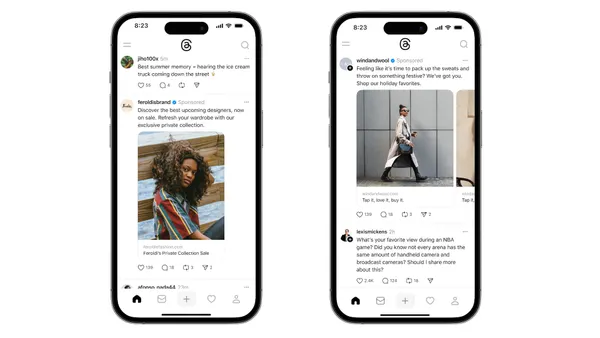Dive Brief:
- The average level of advertising fraud is about 15% among networks that sell ad space on mobile apps, according to a study by Tune, a Seattle-based mobile marketing firm. It examined 24 billion clicks on 700 ad networks to look for signs of fraudulent activity in the form of fake clicks, users or app installs, and it found that eight ad networks were 100% fraudulent and 35 ad networks had more than 50% fraudulent activity.
- Click fraud costs advertisers anywhere from $7.2 billion to $16.4 billion a year, according to estimates cited by Tune. Without naming names, the firm said some ad networks are very reliable, but the fraudulent ones give the industry a black eye.
- Detecting fraud can be complicated when an ad network brokers with other networks to obtain additional inventory of media placements, Tune said. When re-brokering happens more than once, traffic quality can suffer, said John Koetsier, a mobile economist at Tune.
Dive Insight:
Mobile ad fraud is another manifestation of shady digital activity that is getting more attention, particularly after last year’s “Methbot” ring that suckered advertisers with fake websites and clicks. To avoid becoming a victim of fraud, marketers need to continually monitor and measure the effectiveness of their advertising. Tune recommends keeping an eye on the return on investment for an ad campaign, including direct sales, app downloads and customer lifetime value in relation to customer acquisition costs.
Fraud is just one of the challenges brands face in a digital media landscape that is also fraught with fake news, low-quality ads, a lack of transparency and growing use of ad blockers. In this environment, marketers need to take a proactive approach to media buying.
Checking the compliance and quality of ad networks also provides insight on whether the mobile response is legitimate. That can be complicated when a mobile ad network brokers with other networks to place ads on sub-publishers that don’t have legitimate users or click activity. The other difficulty is the time lag between the fraudulent activity and when it’s detected, which can be weeks later.
Gaming apps are the most prone to fraud, according to a February study from ClicksMob, a mobile app marketing agency based in Great Neck, N.Y. Mobile gaming is an appealing target for fraud because its high engagement means that users are more likely to see advertising, the firm said.












